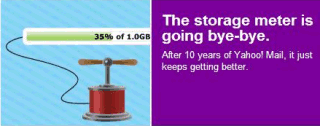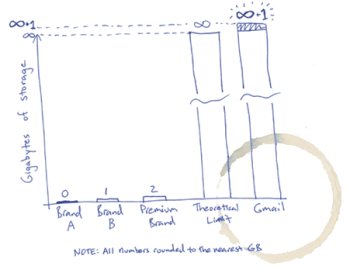| | Yahoo Mail | Windows Live Hotmail | AOL Mail | Gmail |
| Storage | "unlimited" | 5GB (10GB)* | "unlimited" | 2.8GB+ (8.8GB+)* |
| Maximum attachment size | 10MB (20MB)* | 10MB (20MB)* | 16MB | 20MB |
Three years ago, when Gmail was launched, it offered 250 times more storage than Yahoo Mail and 500 times more storage than Hotmail.
"Google believes people should be able to hold onto their mail forever. That's why Gmail comes with 1,000 megabytes (1 gigabyte) of free storage – more than 100 times what most other free webmail services offer." (from the press release)
The competing services quickly adjusted and increased their offerings. At that time, Gmail was invite-only so it couldn't capture too many users. Gmail started to be available to everyone in February, when Yahoo Mail and Hotmail already had many of Gmail features.
While Gmail still has unique features (conversations, labels, POP3, mail fetcher, unobtrusive ads, advanced search, attachment preview), it's difficult to understand why Google intentionally lost the battle of mail storage, after starting it three years ago. Maybe 2.8 GB is enough for most people or maybe the storage space isn't a distinctive feature anymore.
In a Wall Street Journal article about Yahoo's "unlimited" storage, "one Yahoo executive conceded that a main reason for the move to no limits was to eliminate the perception that Gmail still offered more storage, even though Yahoo had long since caught up."

So all these announcements about "unlimited" storage are just some marketing schemes (there's no such thing as unlimited storage). As very few people use more than 1 GB of mail storage, any webmail provider could easily replace 1 GB or 2 GB with infinite storage. But Google decided to stop playing this game and to let others implement the "Infinity+1 storage plan" (explanation: Gmail's homepage on April 1st, 2005).
